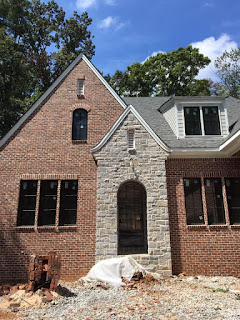What Does a Builder Do?
It is difficult to understand the sheer complexity of a builder’s job and the systems required to build a house from scratch. Although it is difficult to calculate, the estimated number of parts in a new home range from 600,000 to 1,500,000. In addition, these parts are all installed outdoors, subject to weather conditions, as opposed to ideal conditions in a manufacturing facility.
Many analogies have been used to describe the professional builder: the conductor of an orchestra, the captain of a ship, a leader of a military campaign. The point is that the builder is the one who must coordinate the innumerable players and products needed to transform a set of two-dimensional drawings into a finished home. The builder has to make sure that everything happens just when it’s supposed to, and that the end result is exactly what the clients envisioned.
Ideally, this responsibility begins well before the first shovel breaks ground. One advantage to choosing a builder early in the design process is that the builder can make sure the home can be built in the most efficient and cost-effective manner. The builder will know the cost of various options and can help the homeowner decide whether or not to include these options in the final set of plans. Bringing on a builder at this early architectural stage can yield significant cost savings.
Once the plans are complete, the builder has to work with local zoning and code authorities to secure the proper permits. Professional builders have a thorough understanding of building codes, as well as good working relationships with local authorities. This is another big plus to hiring a pro: the building department is likely to scrutinize more closely a permit application submitted by a homeowner, or even by a small building company, than one submitted by an established professional contractor with a reputation for solid management and quality work.
Professional builders also have close relationships with quality subcontractors. And because the builder is a source of ongoing work for those contractors, prices offered to the builder will likely be less than prices offered to anyone else.
Once the project is under way, the builder’s management skills really make a difference. These skills include:
- Keeping the job on schedule by ensuring that all workers and materials show up at exactly the right time. Construction timetables can change quite often, with causes that range from bad weather to late deliveries. The time and organization required for the builder to constantly adjust everyone’s schedules is something homeowners seldom see.
- Overseeing the job to guarantee that all trades deliver quality work. The builder knows enough about each specific trade, and has a good enough relationship with each subcontractor, to make sure things get done right. For example, if it’s too cold to pour a concrete slab, the builder will have the knowledge and authority to put it on hold even if the concrete contractor is tempted to move ahead.
- Solving and preventing problems. A new custom home is an extremely complex undertaking with a million things that can go wrong—and that will go wrong without a skilled and experienced person in the lead. Having a professional builder in charge of solving problems takes a lot of stress off the homeowners.
- Completing the punch list at the end of the project. Everyone has heard horror stories of unprofessional contractors who left a job incomplete and no longer replied to the customer. The professional builder has the resources to make sure that everything is complete and will continue a positive relationship with the customer. That is why it is very important to call and speak with customers who have completed a home with your prospective builder.
Finally, from start to finish the builder protects the homeowner by carrying the needed licenses and insurance policies and confirming that everyone else on the job is similarly covered. Building a home is not a simple endeavor. Good builders have well-honed management systems for making it all happen. These systems are an important part of the professional builder’s value.


Comments
Post a Comment